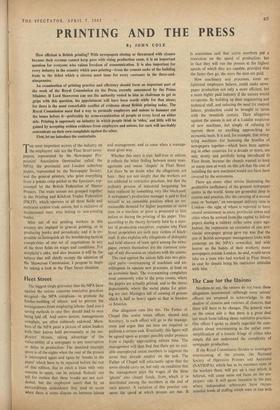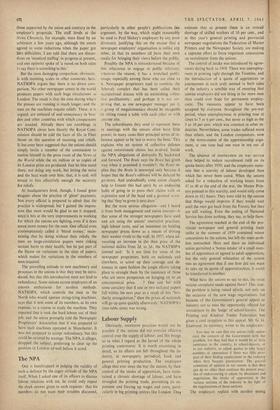The Case for the Unions
Needless to say, the unions do not leave these allegations unanswered--although some unions' officers are prepared to acknowledge, in the shadow of closures and rumours of closures, that there will have to be changes. The general view on the union side is that there is a great deal too much loose-talking about restrictive practices. One officer I spoke to clearly regarded the com- plaints about overmanning as the unfair over- simplification of a lunatic fringe of critics who simply did not understand the complexity of newspaper production.
If the Royal Commission decides to investigate overmanning of the presses, the National Society of Operative Printers and Assistants (NATSOPA), which has as its members most of the workers there, will put up .a case which, it believes, will cause some red faces on the em- ployers' side. It will quote instances in the past where independent arbitrators have recom- mended levels of staffing which were in line with those supported by the union and contrary to the employer's proposals. The staff levels at the News Chronicle, for example, were fixed by an arbitrator a few years ago, although the union agreed to some reductions when the paper got into difficulties. I am told that there are discus- sions on 'standard staffing' in progress at present, and one optimist spoke of 'a mood on both sides to say there is something in this.'
But the most damaging comparison, obviously, is with manning scales in other countries; here. NATSOPA argues that there is no direct com- parison. No other newspaper centre in the world produces papers with such huge circulations is London. The result is that the time during whica the presses are running is much longer,. and the men on the machines require reliefs. These, it is argued, are unheard of and unnecessary in Swe- den and other countries with which comparisons are essayed. Already there are rumblings in NATSOPA about how bluntly the Royal Corn- mission should be told the facts of life in Fleet Street on this question of manning and reliefs. It has even been suggested that the unions should simply invite a member of the commission to station himself in the press room of the News of the World while the six million or so copies of its London print are produced. Just let him stand there, not doing any work, but letting the noise and the heat wash over him; that, it is said, will reveal to him effectNely enough the necessity for reliefs.
At headquarters level, though, I found great disquiet about the practice of 'ghost' payments. Not every official is prepared to admit that the practice is widespread, but I gained the impres- sion that most would be glad to see it stopped, since it hits at the very improvements in working for which the unions are fighting, even if it does mean more money for the men. One official even contemptuously called it 'blood money,' main- taining that by doing without their reliefs, the men on large-circulation papers were risking serious harm to their health; but he put part of the blame on variations in the sizes of papers, which makes for variations in the numbers of men required.
The prevailing attitude to new machinery and processes in the unions is that they may be intro- duced, but that this introduction must not lead to redundancy. Some unions accuse employers of an uneven enthusiasm for modern methods. NATSOPA, which controls the men in the North who would operate string-tying machines, says that it sent some of its members, at its own expense, to a course to study the machine. They reported that it took the hard labour out of their job, and the union promptly told the Newspaper Proprietors' Association that it was prepared to have such machines operated in Manchester. It was not prepared to accept redundancy, but this could be covered by wastage. The NPA, it alleges, dropped the subject, preferring to clear up the position in London ag well before it acted.







































 Previous page
Previous page